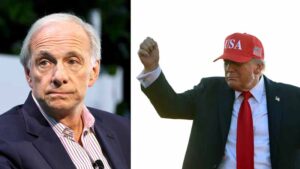
Donald Trump (AFP)
Donald Trump has once again escalated his war of words against the media, threatening to target journalists he labels as “the enemy of the people.” A new report warns that, if re-elected, Trump will have powerful tools at his disposal to make good on his threats, including the ability to clamp down on media outlets that oppose him.
One of Trump’s key nominees for positions in his administration, Kash Patel, has already threatened to “come after” journalists who he believes treated the former president unfairly. In addition, Trump has openly called for the Federal Communications Commission (FCC) to revoke the licenses of what he considers “fake news” outlets that have drawn his ire.
According to experts, Trump’s proposals raise serious concerns about press freedom in the United States. Legal analysts have warned that Trump could potentially target journalists through an emergency declaration. “Will Trump declare a national emergency and use the Communications Act to shutter stations of his choice?” asked Gabriel Schoenfeld, a senior fellow at the Niskanen Center.
He added, “His nominations of individuals like Patel, Pete Hegseth, and Tulsi Gabbard (not to mention the dropout, Matt Gaetz) reveal that he intends to be a radical president, unconstrained by established norms and willing to push the law to the limits if not beyond them.”
Another avenue for attacking journalists, Schoenfeld points out, could be the use of broadly written espionage statutes, such as those under which Trump himself was accused in the Mar-a-Lago documents case. The Justice Department, he notes, could use these laws to target journalists who publish information damaging to Trump’s administration, told The Bulwark.
While espionage laws are designed to protect national secrets, they are often applied in ways that could ensnare reporters. “While they serve the legitimate purpose of protecting the nation’s secrets, they are drawn in a way that can capture journalists in their web,” Schoenfeld explained.
The U.S. government, he said, often overclassifies national defense information, and publishing such material is a routine part of American journalism. However, recent years have seen a push to prosecute government leakers without targeting journalists themselves—except in the case of WikiLeaks founder Julian Assange, who pleaded guilty to violating the Espionage Act in June 2023.
With a conservative U.S. Supreme Court now in place, experts suggest the Court may be more inclined to support prosecutions against journalists who defy Trump or publish information he wishes to keep secret. Schoenfeld warns that journalists should “lawyer up” in preparation for this potential crackdown.
“With a series of extreme appointments, the architecture of authoritarianism is being constructed before our eyes,” Schoenfeld concluded. “Eviscerating the First Amendment will be a key part of that effort. When it comes to freedom of the press in the second Trump term, we are facing a five-alarm fire.”


